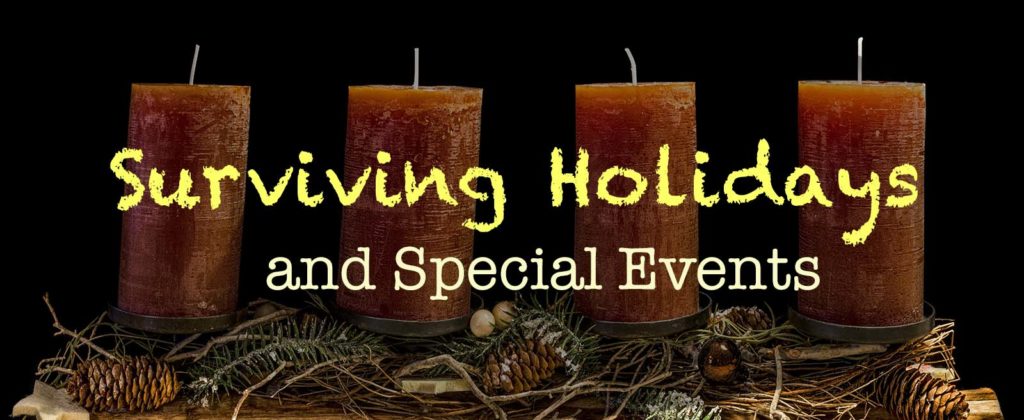
Surviving Holidays and Special Events
Holidays and special events should be times of great joy, but dieters approach these occasions with fear and panic. Why? Because a celebration’s not a celebration without tons of high-calorie, tempting foods. Does this mean that you have to become anti-social to avoid temptation? Not if you plan a “survival” strategy beforehand and stick to it. This strategy should address actions before, during, and after the event.
Holidays and special events are usually non-stop cues for eating. Trays of nibbles are set out, alcohol is served in abundance, and meals are served that could feed an entire army battalion. Besides physical food cues, stress of preparation, the letdown after the event, and the depression triggered by sad memories, often prompt emotional eating.
Holiday Survival Tips
On the day of the event, there are several ways you can control your eating. These tips can reduce stress and associated eating cues before they happen.
✅ Eating a betterMD nutrition product or high-bulk foods, such as an apple, salad, or bowl of whole-grain cereal, can fill you up beforehand so you don’t overeat.
✅ As soon as you get to the function, look over the food and pick out a few “special” foods to eat and skip all the others.
✅ Eat slowly and savor every bite to maximize your enjoyment. By allowing yourself selected delicious foods, you can enjoy yourself without needing to pile on everything in sight.
✅ Just to be on the safe side, you might want to cut back your intake for a few days before and after so you can have a little extra at your celebration.
What you do on Thanksgiving is far less important than what you do before and after the party.
Mike Murdy, betterMD founder
If You Are Hosting an Event
Plan Ahead – If you’re doing the entertaining, the preliminary work can be especially taxing. With hectic schedules, there never seems to be enough time to plan, clean, shop, and cook. You can help yourself by practicing time management and getting help from others. To plan your time, sit down and write out daily schedules for the weeks before the event. Determine what you can reasonably do in that time frame and when you plan to do it.
Accept Help – Remember that you don’t have to do everything yourself. Get your spouse, children, and other relatives involved with the cleaning, shopping, and cooking. For example someone can go to the grocery store, while others clean assigned areas of the house, and your guests are probably happy to bring some of the food. If it’s in your budget, consider hiring help to clean, cater meals, and serve food.
Menu Planning – In planning the types of food to serve, why not choose healthier, low-calorie alternatives? You don’t necessarily have to give up traditional favorites if you modify recipes to cut down on sugar and excessive calories. For instance, turkey stuffing can be made with sauteed onions and celery in broth rather than butter. A simple way to cut calories in gelatin molds is to use sugar-free gelatin. Take a look at your recipes to see if you can eliminate or decrease some ingredients or substitute lower calorie alternatives. You can feel good about helping your friends and relatives eat healthier!
It’s also a great time to establish new traditional dishes. There are lots of low-calorie, gourmet cookbooks on the market. Look through some to see if any of the delicious dishes would fit into your entertainment.
Leftovers Can Be Challenging
Try these strategies to minimize “leftover hangover”
👍 Too often food goes into your mouth rather than the storage container, even if you’re already stuffed. Chewing sugarless gum or asking others to help in cleaning up can decrease your chances of nibbling on leftovers.
👍 You can prevent next-day, high-calorie consumption by giving take-home packages to your guests, taking food into work, or dividing leftovers into small-portion homemade TV dinners.
💯 Probably the best way to avoid the leftover problem is to not cook so much food in the first place. Everyone will be satisfied and less “bloated” afterwards if you cook only enough to serve your guests.
Holiday Goodies and Treats
What do you do if your friends and family traditionally give baked goods, gourmet food baskets, candy, or alcohol for gifts? Beforehand, tell everyone about your diet and ask them to forego food gifts. If you still get them, thank the person, but later give the food away to friends, neighbors, or co-workers. This way, you won’t hurt the giver’s feelings, and you’ll eliminate temptation.
The Reason for the Season
The final suggestion for handling holidays and special events is to return to the original intention of these occasions. They’re intended as social gatherings with friends and families, not food orgies. Start emphasizing the social interactions. Plan group activities that everyone will enjoy. If possible, include group walks or physical activities that are fun and burn calories! By enjoying the company of others, you can focus on fellowship instead of food.
Blessings and Well Wishes 🙏 from betterMD and the Murdy Family
